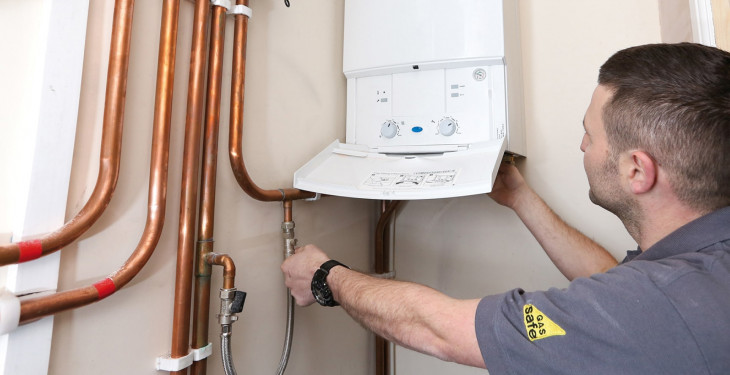

Written by Stephen Day
Gas Safe Engineer
Updated: 6th February, 2026
One of the most common and frustrating error codes your Vaillant boiler can present to you, the F75 warning represents a potentially serious fault concerning your boiler's function and subsequently its ability to heat your home.
Get a new boiler quote, save up to £550 per year (0% APR available).
Here at iHeat we’re boiler experts and in this blog we’re going to be taking a look at the F75 Vaillant boiler error code, specifically its meaning, the causes behind this and how to remedy the problem.
Get a quote in 60 seconds, fitted as fast as next day!
0% APR finance available.
A boiler error code does exactly what it says on the tin, presents the owner of a boiler with an alphanumeric three digit fault detection message (e.g. F75) upon the system detecting something such as an integrated component not functioning as it should.
An error code can be found on a boiler's display screen which is usually at the centre or near the bottom of the boiler unit, on some models the screen is covered by a folding down plastic panel.
The code being displayed can be identified and further explained in the appliances user manual or on some manufacturer’s app.
We are aware of the desire to rectify a heating issue ASAP, especially if the fault has caused the boiler to lockout (shutdown to prevent further fault).
The option of simply restarting the boiler may often solve the issue being brought to your attention by an error code… temporarily.
It can prove wise to first fully investigate and understand the cause of the error, this is the most efficient way of ensuring the issue can be fully remedied, making it less likely to occur down the line.
The Vaillant F75 can be put down to a pressure issue, resulting in the boiler being ‘locked out’.
Manufacturers Vaillant explain the issue to be - ‘no sudden change in pressure was detected on turning on the pump’.
The two main causes for a pressure issue and F75 error code are:
The water pressure sensor within a boiler can become blocked over time with a variety of contaminants including debris, dirt and limescale.
This can cause the sensor to perform sub-optimally in terms of reading and reacting to pressure changes.
If the boiler's pump sounded and felt as it normally would when operational, but there was a lack of hot water in the presence of an F75 error code, the fault is more than likely pressure sensor related.
Some earlier Vaillant models were claimed to be fitted with poor quality heating pumps, prone to splitting and leaks, two common causes of an insufficient amount of water getting into and out of the boiler, leading to the presence of a F75 error code.
You can confirm the pump is the area of concern if the boiler is switched on, but you can't feel or hear any operational noise.
If the pipework has a leak, it will prevent a sufficient amount of water from reaching the boiler, and no pressure will be detected by its sensor.
This problem is the least common of the three discussed, and to confirm its occurrence you must be fully certain the boiler's pump and pressure sensor are both adequately operational.
For this particular Vaillant error code, it would be unwise to attempt a DIY fix; any of the three potential causes of the F75 would be considered serious and an attempt at an unqualified or inexperienced repair may lead to further function degradation or potential safety issues.
It’s prudent to have an expert, Gas Safe registered engineer to assess the fault and rectify accordingly.
This is a fully trained and qualified gas engineer who is legally licensed under the published Gas Safety (Installation and Use) Regulations 1998 (GSIUR).
The Gas Safe Register is the appointed representative of the safety regulatory group- Health and Safety Executive.
All registered gas safe engineers should carry and be able to present official accreditation and have a verified and unique ID number.
All of our iHeat engineers are registered Gas Safe!

Arranging for your boiler to be annually checked over or ‘serviced’ by a qualified engineer can be a fantastic way of analysing the state of your heating system in yearly increments, identifying and rectifying any faults before they have a chance to progress.
While an individual component such as a pump or sensor can be replaced in isolation, if your boiler is starting to show signs of more serious or repeat decay, it may be beneficial to upgrade to a newer, more efficient boiler.
The best way of ensuring a boiler is operating as it should, is by proactively replacing ageing or faulty boilers at the earliest signs of degradation, this preventative step is far more prudent than reactive maintenance.
Get a quote in 60 seconds, fitted as fast as next day!
0% APR finance available.
Last updated: 6th February, 2026

Written by Stephen Day
Gas Safe Engineer at iHeat
Stephen Day is a Gas Safe registered and FGAS certified engineer with over 20 years of hands-on experience in the heating, cooling, and renewable energy industry, specialising in boiler installations, air conditioning, and heat pump systems.
LinkedInArticles by Stephen Day are reviewed by iHeat’s technical team to ensure accuracy and reliability.

19th February, 2026
Selecting the appropriate boiler for your London home involves understanding the different...
 Read Article
Read Article

19th February, 2026
A typical Annual Boiler Service includes a visual inspection to identify any obvious fault...
 Read Article
Read Article

19th February, 2026
Boiler servicing comprises a set of inspections and tests conducted by a qualified enginee...
 Read Article
Read Article
No obligation. Takes less than 60 seconds.